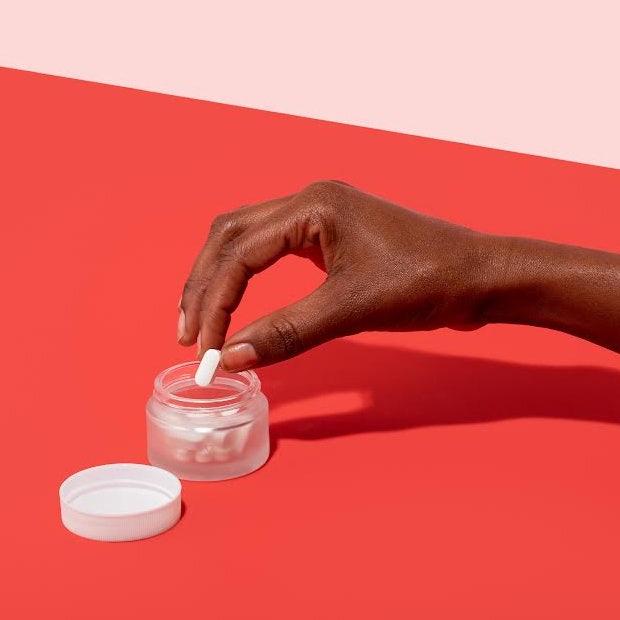How To Deal With An Itchy, Burning Vagina — No Doctor's Office Needed
Find relief through proper treatment.
 New Africa / Shutterstock
New Africa / Shutterstock Our vagina is our most intimate, sensitive body part.
To that end, we’re hyper-aware when anything feels not quite right down there. So when suddenly our vagina is itching or burning, we can’t help but be worried about what could be going on and start looking for solutions — fast.
Just about every person with a vagina will experience these symptoms at some point in their life. The important thing to remember is how common vaginal itching is, even if it feels uncomfortable and frightening.
What causes vaginal itching?
There are many things that can cause vaginal itching and burning, but the source of itchiness isn't always the vagina itself.
“When we say ‘vaginal itching and burning,’ we sometimes are referring to truly vaginal or internal symptoms, but sometimes the symptoms are actually coming from the outside: the vulva (outer part of the genitals) or perineum (space below the opening to the vagina),” says Dr. Kelly Culwell, also known as Dr. Lady Doctor, Board Certified OB/GYN and nationally-renowned women’s health expert.
These symptoms can come from infections, hormonal changes, allergic reactions or sensitivities to soaps, detergents or material from clothing, feminine products, and very rarely cancerous or precancerous growths.
“Vaginal itching and burning are incredibly common and are typically caused by infection (yeast infection or BV), hormonal cause (menopause, pregnancy, lactation, or even use of hormonal birth control pills), external irritant (soap, body wash, lubricant, fabric), or skin condition (eczema, psoriasis, lichen sclerosus),” says Dr. Alyssa Dweck, INTIMINA’s sexual and reproductive health expert.
The good news is, these issues are easily treated. But be forewarned: “Very rarely, persistent, worsening or recurrent itching and burning could be due to something more serious including precancer or cancer of the vulva,” Dr. Dweck advises.
There’s a clear answer that doesn't call for lots of trips to the doctor and expensive treatments: wisp.

Wisp is a safe and convenient way to treat and deal with painfully common vaginal issues by providing affordable medication and support. The medicine is prescribed online, discreetly packaged and delivered right to your door.
This is especially useful during a time when we’re choosing as many virtual options as possible. And with wispcare, you get no-wait access to unlimited online doctor consultations.
As OB/GYN Dr. Staci Tanouye adds, there are so many potential reasons why your vulva or vagina gets itchy, so if it's not obvious, a gynecologist can help sort it out.
“Possibilities include yeast infections, shaving, contact dermatitis from irritants or allergens, various derm conditions like lichen sclerosus, lichen planus, lichen simplex chronicus, eczema, psoriasis, genital warts, HSV, hormonal changes (with normal cycle, pregnancy, OCPs, menopause), precancerous and cancerous changes,” she says.
In addition, adds Dr. Tanouye, on a day to day basis, your vagina and vulva shouldn't be very noticeable as they are relatively self-sufficient: “Outside of normal physiologic discharge and basic cleaning with water and hands, there is very little maintenance that needs to be done. Any bothersome symptoms should be evaluated.”
14 Causes of Vaginal Itching & Burning
1. Bacterial Vaginosis
Bacterial Vaginosis (BV) is not an infection one catches or transmits, and is typically not considered a traditional STI.
“BV results due to an imbalance in the normal flora (bacteria, yeast) that inhabit the vagina,” Dr. Dweck advises. “Many factors can disrupt the vaginal microbiome, alter the natural acidic pH, and cause inflammation, discharge, itching and irritation.”
Common disruptors are hormone changes, antibiotics, highly fragrant hygiene products, steroids, and douching.
BV is not an STI in the traditional sense, but is surely more common in those who are sexually active — and condoms may diminish this risk. “The vagina has natural mechanisms to maintain a proper pH and biome, so in some cases, BV may resolve spontaneously,” Dr. Dweck adds.
The treatment is typically an antibiotic, taken either orally or vaginally. Partners don’t usually need treatment. Many women with BV are asymptomatic, but BV that is symptomatic (i.e., discharge, odor, irritation and itching) is best treated to manage symptoms and lower risk of other infections.
Wisp offers BV Antibiotics, which is a fast-acting treatment. Antibiotics are the most effective way to treat BV and clear inflammation (which increases STI risk).

Wisp's treatment cures Bacterial Vaginosis, and prevents chronic vaginal odor. Those seeking treatment can choose from Metronidazole tablets, Metronidazole gel, Clindamycin tablets, or Clindamycin cream.
2. Yeast infection
“Yeast infections can occur inside the vagina, which usually causes clumpy white discharge that can cause itching or burning; or, outside on the vulva/perineum, which causes the skin to be red, irritated and itch/burn,” Dr. Culwell warns.
Yeast infections are uncomfortable and frustrating, but there are treatment options available to relieve symptoms.
Wisp offers Yeast Antifungals (Fluconazole), an effective, doctor-trusted treatment for yeast infections. And all you need to do is privately and discreetly message a doctor, skipping the waiting room entirely.
.jpg)
3. Sexually transmitted diseases
While burning is common with STIs like Chlamydia, gonorrhea, and trichomoniasis, STDs like herpes can also cause itching and pain, especially with urination, as well as vaginal discharge or pelvic pain.
Dr. Tanouye adds that it's more common to experience vaginal burning from non-STI sources, like yeast infections or skin conditions. However, in the case of STDs like herpes, gonorrhea and Chlamydia, "It's important to note that about half of gonorrhea and Chlamydia infections don't have any noticeable symptoms at all, which is why it's most important to get screened.”
Since genital herpes is incurable but 100 percent treatable, wisp offers Valacyclovir & Acyclovir For HSV-2 and a topical Acyclovir cream.

These treatments prevent and suppress outbreaks, which can cause pain, burning and itching. Using wisp means you can get herpes treatment from the comfort of home, without hassle or judgement.
4. Hormonal changes or peri/menopause
Peri/menopause is associated with lower estrogen, and lower or less estrogen means less blood flow and natural lubrication.
“Low estrogen levels impact the vaginal tissue, making it 'atrophic' with less elasticity, more fragile and delicate, and more prone to infection, including BV,” warns Dr. Dweck.
The pH may also be altered due to this hormonal change, as noted. Vaginal atrophy is associated with symptoms of itching, burning, dryness and discomfort.
5. Urinary tract infections
A urinary tract infection (UTI) generally doesn't have symptoms that include itching, but makes urination painful, urgent, and frequent. Symptoms can also include smelly urine and pelvic pain.
UTIs are caused by “the inflammation of the urinary tract, caused by bacteria growth in the urethra, bladder, and/or kidneys,” says Dana Bruck, L.Ac, MSTCM, and co-founder of OVA MOON.
Thankfully, you don't need to spend too much time in pain, as wisp offers fast, same-day treatment for UTIs.

Wisp’s UTI treatments include antibiotics, boric acid suppositories, and reproductive probiotics, all meant to help with discomfort and offer treatment for all symptoms, without a trip to the doctor's office.
6. Eczema or psoriasis
While many experience eczema or psoriasis on their face or body, this uncomfortable and itchy condition can also cause vaginal itching or burning if an outbreak ends up in that area.
Symptoms of vulvar eczema may include itchiness, especially in the outer part of the vulva where there is hair or thicker skin with creases.
“Eczema is quite common, especially if you have asthma or other allergies," notes Dr. Nicole Williams, board-certified OB/GYN, founder of the Gynecology Institute of Chicago, and author of This Is How You Vagina. "While not dangerous, it can be very bothersome. "Look for redness or pale, flaky skin. Make sure to see a vaginal specialist for a diagnosis.”
7. Contact dermatitis
Dermatitis is a skin condition that can cause burning and itching in the vaginal area. Symptoms may include soreness, burning, and rawness, or a vulvar area that is pale or pink, with a white lacy pattern.
Luckily, there are a few ways to prevent dermatitis, including being mindful of certain scented products.
“This is exactly why I advocate for simple vaginal care of soap, water, and sunshine,” Dr. Williams advises. “When using smelly soaps, oils, or other products, you may cause an allergic reaction to the sometimes sensitive vaginal skin. Use plain soap like Dove or Ivory, and avoid scrubbers like a loofah. Also, don't wear underwear to bed unless you're menstruating.”
8. Pubic lice
Pubic lice, also sometimes known as crabs, are lice in the pubic area. It’s embarrassing, can be itchy and irritating, and is often dealt with in the same way as head lice: a lice shampoo treatment or lotion, and cleaning underwear and clothing.
“A sexually transmitted condition, pubic lice are tiny living organisms that burrow under the skin. This must be treated or else it will lay eggs and multiply. Have your vaginal specialist examine the area closely,” says Dr. Williams.
9. Lichen sclerosus
Though uncommon, Dr. Williams sees this condition very often in her practice. "Lichen sclerosus is an autoimmune condition that causes discoloration and itching,” she says.
Additional symptoms can include redness, white skin patches, bleeding, or painful sex, and tends to be recurring.
10. Vulvar cancer
Vulvar cancer usually affects women over the age of 60, and less than 20 percent of women under the age of 50 are diagnosed. Symptoms can include pain, tenderness, changes in color or thickening of the skin, itching that persists, and bumps or ulcers.
“Look for any discoloration, growth, or any other new changes in your skin. Your gynecologist can perform a biopsy, which will make the diagnosis,” recommends Dr. Williams.
Luckily, vulvar cancer is often caught early and is treated with surgery.
11. Genital contact allergies
The vagina is a mucus membrane that can be sensitive to latex condoms and lubricants.
“Allergic reactions can cause itching, swelling, and burning inside the vagina after sex. Switching to non-latex condoms and a water-based lubricant will solve this problem,” advises Dr. Jodie Horton, MD, and chief wellness advisor for Love Wellness.
But along with sensitivity to condoms and lubricants, many women don't realize that semen can also cause vaginal irritation and itching.
“The pH of the vagina is between 3.5 to 4.8, but semen has a pH of 7. Semen can disrupt the pH balance of the vagina and cause a vaginal infection in some women. If this happens frequently, you should consider using condoms,” Dr. Horton adds.
This may not happen with all your partners, but is still something to consider.
Wisp offers Harmonizing Lube, which is silicone-based to reduce friction and make sex easier, more pleasurable, and more fun.
.jpg)
The Harmonizing Lube is hypoallergenic, fragrance-free, condom-safe, keeps its slip in water and helps maintain a healthy pH balance.
12. Waxing or shaving
While many women wax or shave around their bikini line, specifically, doing so actually might come back to bite you. Instead of shaving, trim the area.
“Just keep the hair trimmed short like that of a military recruit. You will maintain the helpful glands which keep your vagina soft and well lubricated, and avoid annoying folliculitis (hair bumps),” Dr. Williams suggests.
13. Irritants
It may be tempting to use scented soaps or sprays, but you're harming your vagina in the process. Instead, the vulva can be washed with a fragrance-free, pH-balanced cleanser and warm water.
“I always recommend keeping your feminine hygiene routine simple,” advises Dr. Horton. “The inside of the vagina does not need to be cleaned with soap, spray, deodorants, or douches. This disrupts the pH balance of the vagina and causes an overgrowth of bacteria that can lead to yeast and bacterial infections.”
14. Stress
Stress and anxiety can affect the immune system and make you prone to infections. But, adds Dr. Horton, “It can also affect the blood flow to the vagina, which can decrease vaginal lubrication that leads to dryness and painful intercourse.”
And all that stress means damage to your vagina.
“Vaginal dryness can lead to friction and microtears in the vagina, causing burning and itching. Reducing stress, introducing foreplay before penetrative intercourse, and using neutral water-based lubricant can help reduce vaginal dryness and irritation as well.”
How to Treat Vaginal Itching and Burning
When you're suffering from vaginal itching and burning, the last thing you need is a bunch of complicated steps.
Wisp’s Symptoms Quiz is easy to use and helps you to determine which condition you may have. By answering a series of questions about your symptoms, wisp gives you specific medication or treatments for your condition.
Once you complete the quiz, you’ll also be introduced to antibiotics available on wisp, as well as at-home remedies and preventative measures.
In fact, there’s a lot of at-home remedies that can make a big difference in preventative measures and feeling better when there’s already a problem.
1. Start with a good probiotic.
Your gut health is important and can affect other areas of your body, making probiotics beneficial to your health.
Research has shown that probiotics can be helpful for those who suffer from yeast infections or bacterial vaginosis, both for lessening symptoms and helping to avoid an infection in the first place. The good bacteria in probiotics also helps to balance the pH level of the vagina.
A container of your favorite yogurt as an afternoon snack can load your body up with the probiotics you need. “You can take a capsule form or eat foods like yogurt and sauerkraut,” suggests Bruck. This will help bring more healthy bacteria back into the body.
2. Add garlic and oregano into your diet.
Stop feeling guilty about eating pasta loaded with garlic and oregano. It's not only delicious, but it's surprisingly good for you and your vaginal health.
“Garlic and oregano have antibacterial and antifungal properties that will help reduce overgrowth of fungus or bacteria,” Bruck says.
In fact, oregano has been found to be effective against different types of Candida, a common cause of yeast infections. Garlic's antifungal properties have also been known to safeguard against yeast.
3. Use tea tree oil for topical relief.
Another way to treat yeast infections and vaginal itching is with diluted tea tree oil.
This essential oil has been used to treat and heal wounds and skin infections for centuries, making it another great option to prevent vaginal issues. Research has also found that tea tree oil is an effective treatment against multiple strains of Candida bacteria.
“Tea tree oil is also antibacterial and antifungal, and can provide some topical relief,” advises Bruck.
Be sure to dilute it in another oil before applying to the area, and apply the oil to a less sensitive area of the body first to make sure you don’t have any adverse reactions.
4. Change your underwear.
We are what we wear, in one crucial way. Clothes that are tight and wet — a swimsuit or underwear, for instance — can trap heat and moisture, making yeast infections more likely or worsening symptoms
Dr. Dweck says to get out of a wet bathing suit or workout clothes immediately after you're out of the pool or are done exercising. Also, be sure to use organic 100 percent cotton underwear to avoid irritation.
When to See a Doctor
Remember that not all vaginal itching and burning issues can be remedied at home. So, if symptoms don’t clear after 3 days, be sure to make an appointment to see your doctor.
“Some of these infections can lead to worse infections that have long lasting impact on the body, and some will just need a stronger treatment to go away,” warns Bruck.
“While it usually isn't a reason to worry, it also shouldn't be something that you ignore. If you have these symptoms, you could be evaluated by a healthcare provider who can help figure out what is going on,” Dr. Culwell strongly advises.
-Created in partnership with wisp
Aly Walansky is a NY-based lifestyle writer who focuses on health and wellness. Her work appears in dozens of digital and print publications regularly. Visit her on Twitter or email her.
YourTango may earn an affiliate commission if you buy something through links featured in this article.
